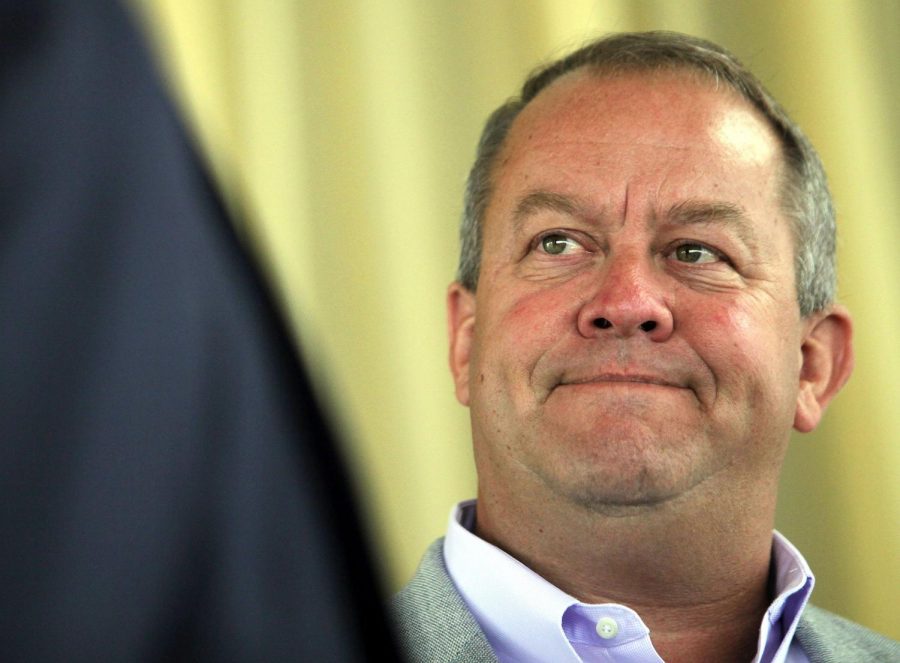University can learn to address assault — starting with sports
Photo courtesy of Tribune News Service
Michigan State athletic director Mark Hollis recently retired following USA Gymnastics sex abuse scandal involving Larry Nassar. Nagelburg believes that universities around the country can use this instance as an example in stopping sexual abuse in sports.
January 30, 2018
We were playing Apples to Apples in the Hebrew school class I teach the other day. Golda Meir was placed as a response to the adjective “Funny.” I asked why her name was put down and the students answered it just sounded funny. I told them that Golda Meir was not funny, and that she was a strong woman who was Prime Minister of Israel from 1969-1973. I told them she stood up for Women’s Rights and was a model to the world that women can be leaders.
They asked me how I knew she stood up for Women’s Rights, and I decided to share a story that always inspired me. While Golda Meir was Prime Minister, there were a series of women assaulted late at night, and a group of male political leaders suggested imposing a curfew for the women. The story continues that Golda Meir responded, “But it’s the men who are attacking women. If there’s to be a curfew, let the men stay at home, not the women.”
“What do you mean assault, what’s assault?” one student asked. “It means bad things happened to them,” I tried to answer. “Like, she was beat up?” the student asked. “Just bad things she didn’t want to happen to her happened,” I answered again and watched each student in the class nod, apparently content with my answer.
We moved back to our lesson.
I wasn’t planning to have that conversation, and I wasn’t prepared to have it in that moment, but as the class drifted back to practicing their prayers, my mind drifted back to a few weeks ago when the media reported that Larry Nassar, former USA Gymnastics doctor, had abused more than 150 girls.
In middle school, I was a competitive gymnast. I was enamored by the sport and watching the Olympic team compete. Like many young girls, I wanted to be just like them.
So, when the news broke, I was shaken. The sport I loved, that taught me to understand my own strength, challenge my limitations, and be appreciative of all I was capable of, was in the headlines for the worst of reasons.
The news reads that 156 victims spoke in court over a period of seven days, but “victim” does not describe all that they are. They were world-class athletes who became victims when they went to receive medical treatment and instead received abuse. They were revictimized when they spoke up about what had happened to them and had their concerns trivialized and ignored by people and organizations in charge.
And now they are icons, calling themselves an “army of survivors.” They added their names to the hundreds upon hundreds of women and men who have come out in the last number of months, sharing their stories of assault and calling for a change.
Social media has been captivated and moved by stories such as the Larry Nassar case for the last year. While different cases have involved actors, musicians and politicians, the theme of sports has been a recurring one as well.
Last spring, Indiana University’s athletic director introduced a policy that prevents accepting “any prospective student-athlete — whether a transfer student, incoming freshman or other status — who has been convicted of or pleaded guilty or no contest to a felony involving sexual violence.”
Over the summer, our University athletic director Josh Whitman considered adopting something similar. However, he added the caveat that, “one of the primary reservations about a policy like this (is) … I do believe in second chances. I do want students to learn from their mistakes.”
We need to have a very clear policy on our standards and values as a University. Are we standing with the thousands of individuals who have shared their stories and drawing a clear line that the actions done to them are inexcusable? Or are we continuing to weakly and ineffectively ignore these voices and continue down the road we are on?
Sports teach children strength, how to be a member of a team, how to feel camaraderie, how to set goals and so much more. A University campus similarly is designed to take our collective lived experiences, educate us and produce the next generation of leaders.
In order to reach that end point, every element of our experience on campus plays a role. Who the athletes we look up to are, who the professors in the front of our classrooms are and who the students walking beside us on the Quad are should be carefully selected.
Aly Raisman, Olympic medalist and one of the many who came forward to share that she too was a victim in the Nassar case, spoke for 13 minutes directly to him. “Larry, you do now realize that we, this group of women you so heartlessly abused over such a long period of time, are now a force and you are nothing. The tables have turned, Larry. We have our voices, and we are not going anywhere.”
Beyond the strength it must have taken for her to speak these words to the man who abused her, her words carry great strength and significance. These women are not going anywhere, and neither are the stories of all the others who have abused, neglected and mistreated others for so many years.
As students here, we too have our voices. How we use our voices to shape the future of this University experience is within our control, and it is time we use our voices to form a future we can all be proud of.
Hayley is a junior in ACES.







